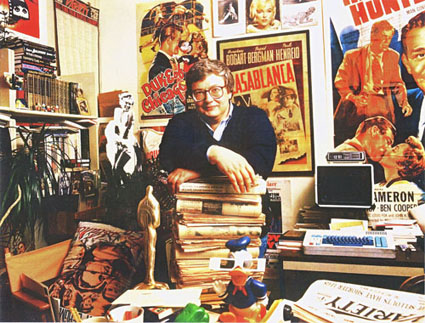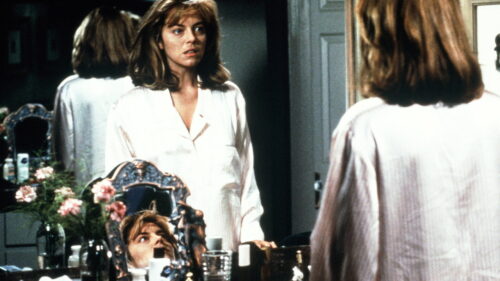It has been three years since Roger Ebert passed away. To mark the occasion, we’re spotlighting thirteen of his most distinctive (and in a couple of instances, controversial) reviews.
Roger called Stanley Kubrick‘s film “an ideological mess, a paranoid right-wing fantasy masquerading as an Orwellian warning. It pretends to oppose the police state and forced mind control, but all it really does is celebrate the nastiness of its hero, Alex.” This is one of those instances where consensus says Roger “got it wrong,” but I don’t think he did, exactly. It’s possible to think that a film is worth seeing while still feeling that it’s not perfect in every way. Here, as in his review of “Blue Velvet“—another violent and disturbing movie that Roger had problems with, and that is mostly adored by critics—the critic admires the movie’s craft and originality (and says so) but distrusts aspects of its vision. He asks whether the film is getting off on its images of cruelty, and whether it ought to. That’s an important question rarely asked by people who push “A Clockwork Orange” as an unmitigated classic. Caveats like “If the film disturbs you, it has done its job” are sometimes trotted out reflexively, without subjecting movies to the scrutiny that Roger brings here. For what it’s worth, other prominent viewers have accused “A Clockwork Orange” of using the story of a criminal’s psychological rape by the state as an excuse to encourage viewers to revel in the exploits of a rapist and batterer. Pauline Kael questioned the film’s methods, and Quentin Tarantino once said, “I don’t think Stanley Kubrick was condemning violence in ‘A Clockwork Orange.’ He wanted to film that stuff. It was cinematically exciting.” Even if you disagree with Roger’s conclusion, here or with “Blue Velvet” or any other acclaimed film that he disliked, it’s good to have his nagging voice in your head as you watch. It keeps you honest.
“It envelops us in a red membrane of passion and fear, and in some way that I do not fully understand it employs taboos and ancient superstitions to make its effect,” Roger writes. This is one of many great reminders throughout Roger’s career that certain films display a mysterious understanding of art and the human personality, that it’s so hard to describe exactly how such films achieve their effects, and that sometimes it is better to humbly bow before the movie than oversimplify it. This is, not coincidentally, a great way to get people who might otherwise never consider seeing an Ingmar Bergman film to give one a try. Fifty years after European art cinema became a cultural force in the United States, there is still an anti-intellectual sensibility among many moviegoers—a sense that non-escapist movies are merely “pretentious” and probably boring or impenetrable, so it’s better not to engage with them at all. Reviews like this one are on some level saying, “It’s okay not to grasp every aspect of a movie at the moment that you’re watching it. It’s OK to be carried along, and to understand what’s happening mainly on an emotional level, as somebody who’s lived and suffered, as we all have.”
The first paragraph of this review is one of the most succinct reminders of the important role that Roger’s Catholicism played in his life and work. It’s what enabled him to immediately get Martin Scorsese on a personal level—as somebody raised in that religious tradition, and also as an evolving feminist who understood how Scorsese was trying to examine himself and his limitations and what is now habitually referred to as The Patriarchy, through art. The review stares into the mirror held up by “Raging Bull” and says, “Yes, I recognize myself in there, and it’s not an image that fills me with joy.” “The raging bull,” the piece concludes. “The poor sap.”
“Platoon“
Roger wrote about this Oliver Stone drama in relation to Francois Truffaut’s statement that there can never really be any such thing as an antiwar movie, because war is inherently cinematic, and movies are bound to make it look thrilling even as they lament the human cost. He calls this movie, which was based on Stone’s own experiences as an infantryman, “a film that says—as the Vietnam Memorial in Washington says—that before you can make any vast, sweeping statements about Vietnam, you have to begin by understanding the bottom line, which is that a lot of people went over there and got killed, dead, and that is what the war meant for them.” This one is filled with astute analysis of the filmmaker’s style, in particular the way Stone captures the disorienting physical and ethical uncertainty of combat by shooting and editing the combat scenes in a very particular way.
“It is a work of beauty, poetry and deep mystery, and watching it is like entering for a time into a closed world where one’s destiny may be discovered,” Roger writes, in this review of Agnieszka Holland’s film version of Frances Hodgson Burnett’s book. I love this piece because it shows how Roger never lost touch with the kid inside him. You can picture him as a boy tucked into bed late at night, asking a parent to read just one more chapter of a story that has excited his imagination. The piece gets at how all movies excite the inner child in some way, even ones that are not necessarily presented as children’s’ entertainment, and how good actors can facilitate that. “Holland is alert to the buried meanings of her story, and she has encouraged her actors to act their age—to be smart, resourceful and articulate,” he writes. “They are so good at their jobs that we stop being aware they are children, and enter into full identification with their quest.”

“We know we want it,” Roger writes, in a prescient review of a film released in 1995 and set in 1999. “We want to see through other people’s eyes, have their experiences, stand in their shoes. That’s the unspoken promise of the movies, and as the unsettling prospect of computer-generated virtual reality creeps closer, it is possible that millions now living will know exactly what it feels like to be somebody else.” This one is a fascinating counterpart to Roger’s review of “A Clockwork Orange” (linked above) because it’s about audience identification and the ethics of screen violence, and how the two concerns don’t always sync up, even in smart films. The section on the film’s rape scene is particularly interesting, in light of his complaints about similar scenes in other films: “It’s revealing, how a scene like that seems so much more sad and distressing than the more graphic scenes of violence we see all the time in the movies: [director Kathryn] Bigelow is able to exploit the idea of what is happening; she forces her audience to deal with the screen reality, instead of allowing us to process it as routine ‘action.'”
One of many great examples of Roger’s more or less “making” a director with a spirited rave for one of their films, this review showcases Roger in cheerleader mode, telling his readers, “Go now, buy a ticket to this to see what I’m so excited about, and to get in on the ground floor of what could be a great career” “That [director Kasi] Lemmons can make a film this good on the first try is like a rebuke to established filmmakers,” he writes. This is also a Roger review that talks, in plain language that anyone can understand, about the relationship between film grammar and the way the brain works—in this case, memory. The opening narration, he says, “explain[s] the method of the film. This will not be a simple-minded story that breathlessly races from A to B. It is a selection of memories, filtered through the eyes of a young girl who doesn’t understand everything she sees—and filtered, too, through the eyes of her older sister, and through the eyes of an aunt who can foretell everyone’s future except for her own.” In reviews aimed at a wide audience, it is important to give viewers a context for what they’re about to see, as this one absolutely does. But sometimes it can be hard to do that in a way that does not insult moviegoers who have experienced a wide range of movies and may get impatient during that part of the review, thinking, “Why is Roger telling me this, I already know this!” The answer is: Because not everyone knows this. Roger was good at saying that in a warm, inviting way, the better to keep everyone reading, and make everyone want to see a film he enjoyed but that had certain challenging or off-putting elements.
I love this film, and it just so happens that Roger was really hard on it. He had some of the same objections to this David Fincher film that he had to “A Clockwork Orange” and “Blue Velvet,” asking if the movie was really critiquing machismo or only pretending to. The movie definitely teeters on the brink of celebrating the thing it makes fun of (which is bound up in the very act of making a movie like this one). I think the movie walks that tightrope better than Roger did, but again, it’s good to have a questioning voice in the back of your head as you watch that sort of film, a voice that says, Are you sure you should be enjoying this? What does it say about you that you enjoy this? And why are you getting so defensive when I ask that of you? This line in particular stands out, because of the way it seems to foretell the rise of the superhero epic: “It’s macho porn—the sex movie Hollywood has been moving toward for years, in which eroticism between the sexes is replaced by all-guy locker-room fights.” Hmmmm.

“Moolaade”
A companion to Roger’s review of “Cries and Whispers” (linked above), this Ousmane Sembene film provoked a kind of helpless, grateful awe in Roger, for the way that it confronted an ugly, innately off-putting subject head on, and forced him to come up with ways to convince readers to see it, rather than merely repeating variations of It’s important, it’s noble, it’ll make you feel like a good person over and over. The impossibility of transcending the language associated with The Cinema of Importance becomes the backbone of this review. “Sometimes I seek the right words, and I despair,” he writes. “What can I write that will inspire you to see ‘Moolaade?’ This was for me the best film at Cannes 2004, a story vibrating with urgency and life. It makes a powerful statement and at the same time contains humor, charm and astonishing visual beauty. But even my words of praise may be the wrong ones, sending the message that this is an important film, and therefore hard work.”
“Crash”
I hated this review. Hated, hated, hated this review. Because I hated “Crash.” A lot of people did. But a lot of people loved it. They found value in it. The film’s subjects, bigotry and its twin, fear, were always close to Roger’s heart, and he wrote about them with a fervor that bordered on evangelical. I don’t think Roger was the slightest bit concerned with holding opinions that his fellow critics would consider sophisticated or “correct.” He only knew that some films spoke to him on a very deep level and that he had a duty to communicate that. I have not revisited “Crash” since I saw it and panned it, but I confess that Roger’s review is the only one that makes me think I should. “One thing that happens, again and again, is that peoples’ assumptions prevent them from seeing the actual person standing before them,” he writes. Did I do that with this movie? As I’ve said elsewhere in this article, doubt is a good thing when it comes to engaging with movies. It’s not a good idea to be too sure of yourself or too pleased with your opinions. You might be missing something.
This review of Ava DuVernay’s family drama is an example of Roger’s ability to find a way into an emotionally taxing movie by writing about its vision of life, its philosophy of how people should treat each other, and its representation of certain experiences that everyone has to deal with at some point. The film, he says, “doesn’t tell a story so much as try to understand a woman. Through her, we can find insights into the ways we deal with death. In one way or another, every emotion in this wonderful independent film is one I’ve experienced myself. Grief, of course. But also anger, loneliness, confusion and a sense of lost direction. Above all, urgent conversations you have in your own mind with someone who is no longer alive. How many people, now dead, have you wanted to ask questions you should have asked when they were alive?”

“A.I.: Artificial Intelligence“
Like some reviews contained in Roger’s Great Movies anthologies (and in the archive of this site) his review of “A.I.” revisits and revises his original take on the film, with the benefit of some hindsight. It’s one of the best examples of Roger letting you watch him work through his feelings about a movie, the better to articulate why he thinks it says and does what he believes that it says and does. Here, as is so often the case, Roger looks for what is universal in a movie and then works his way backward to talk about the film’s production history, techniques and specific choices. Roger’s famous phrase that movies are “machines that generate empathy” describes the hero of this movie, an android boy who in theory is synthetic but might have a soul, and inspires concern and sadness in the viewer.
It is tough for me to revisit this review because it was the last one that Roger wrote before his death. It is a necessary review for that reason. It seems to anticipate readers’ grief and embed a reassuring response to it into the fabric of the piece. Reading it feels a bit like finding a note from a deceased loved one that reminds you of everything they stood for and everything you loved about them. “Why must a film explain everything? Why must every motivation be spelled out? Aren’t many films fundamentally the same film, with only the specifics changed? Aren’t many of them telling the same story? Seeking perfection, we see what our dreams and hopes might look like. We realize they come as a gift through no power of our own, and if we lose them, isn’t that almost worse than never having had them in the first place?”













